
We kindly inform you that, as long as the subject affiliation of our 300.000+ articles is in progress, you might get unsufficient or no results on your third level or second level search. In this case, please broaden your search criteria.

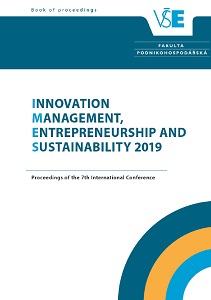
The 7th International Conference Innovation Management, Entrepreneurship and Sustainability (IMES 2019) took place on May 30 – 31, 2019 at the University of Economics, Prague. The conference was organised by the Department of Entrepreneurship of the University of Economics, Prague, Czech Republic in cooperation with other partners.Sound keynote speakers – Martina Musteen (San Diego State University, USA), Ilan Alon (University of Agder, Norway), Andrew Burke (Trinity Business School, Ireland), Arnim Wiek (Arizona State University, USA), Søren Salomo (Technical University Berlin, Germany) and Roy Thurik (Erasmus University Rotterdam, Netherlands) discussed the trends in the fields of innovation management, entrepreneurship and sustainability. The conference aimed to achieve academic excellence in a regional context and to establish a platform for mutual collaboration, exchange and dissemination of ideas among researchers and professionals.These conference proceedings contain contributions of the conference participants presented during both days of the conference. Authors of papers come from 22 countries all over the world, namely from Belgium, Bosnia and Herzegovina, Brazil, Bulgaria, Colombia, Croatia, Czech Republic, Finland, France, Germany, Hungary, India, Mexico, Paraguay, Poland, Portugal, Russian Federation, Slovakia, Sweden, Switzerland, USA and Vietnam. All these contributions have successfully passed the doubleblind peer-review process.
More...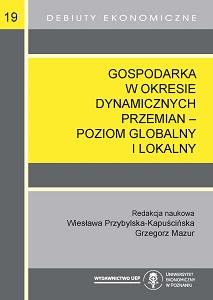
Jednym z zasadniczych celów działania gmin jest rozwój lokalny. Aby efektywnie zarządzać lokalną gospodarką, jednostkom samorządu terytorialnego przekazano pewien zakres samodzielności pozwalający podejmować określone działania dopasowane do potrzeb lokalnej społeczności. Kluczowym aspektem tego zabiegu było wyposażenie gmin w określone źródła dochodów oraz przyznanie im prawa do samodzielnego prowadzenia gospodarki finansowej, rozumiane jako samodzielność finansowa. Celem tego artykułu jest ocena stopnia zależności samodzielności finansowej jednostek samorządu terytorialnego i rozwoju lokalnego. Złożoność analizowanego zagadnienia wymagała zastosowania dwóch głównych metod badań. Pierwszą z nich było wyznaczenie wskaźnika syntetycznego w celu odrębnego pomiaru rozwoju lokalnego i samodzielności finansowej. Druga metoda polegała na wykorzystaniu wskaźnika korelacji Pearsona, aby ocenić zależność pomiędzy tymi zjawiskami.
More...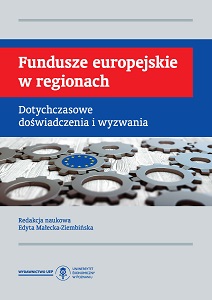
Perspektywa finansowa Unii Europejskiej na lata 2007–2013 w znaczący sposób uprzywilejowała regionalne gospodarki turystyczne krajów członkowskich w dostępie do środków UE. W zupełnie inny sposób potraktowano gospodarkę turystyczną w kolejnej perspektywie na lata 2014–2020, uniemożliwiając praktycznie bezpośredni dostęp do funduszy UE. Przedsiębiorcy turystyczni, lokalne samorządy oraz organizacje turystyczne mogą korzystać z alternatywnych form wsparcia przez środki, których pierwotnym celem nie jest finansowanie rozwoju gospodarki turystycznej, ale innych składowych gospodarki (np. infrastruktury, sportu i rekreacji, przemysłów kreatywnych), zwłaszcza związanych z ochroną środowiska naturalnego i dziedzictwa kulturowego. Celem opracowania jest przedstawienie i ocena polityki wsparcia regionalnej gospodarki turystycznej środkami z funduszy UE. Wskazano na zalecenia dotyczące ewolucji polityki turystycznej w kolejnej perspektywie finansowej UE. W częściach pracy przedstawiono zagadnienia: podstaw funkcjonowania gospodarki turystycznej, polityki turystycznej, oceny prowadzonej polityki turystycznej dzięki wykorzystaniu funduszy UE przeznaczanych na gospodarkę turystyczną w latach 2007–2013 i 2014–2020, kierunków kształtowania rozwoju polityki turystycznej przy wsparciu ze środków UE po 2020 roku.
More...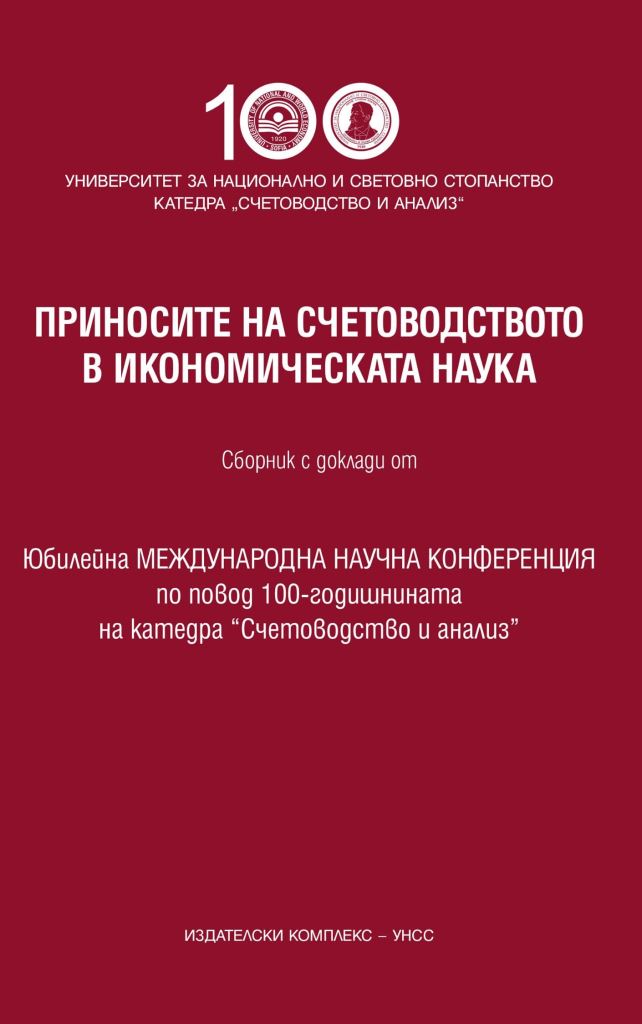
This publication studies two rate-of-return indicators relevant to enterprises with industrial principal activity: 1) labor resources-based rate of return, and 2) labor cost-based rate of return. In its nature, the first indicator describes the ultimate efficiency of use of one of the major production resources –manpower, and the second – the ultimate efficiency of costs incurred for the operation of manpower. With the help of the denominated factor modelling method, we outline and present two-factor model for analysis of labor resources-based rate of return and four-factor model for analysis of labor cost-based rate of return. The two-factor model enables the identification and evaluates the impact of two factors on the difference between the actual and reference level of labor resources-based rate of return: 1) changes of labor efficiency, and 2) changes of return on sales. The four-factor model gives the opportunity to identify and evaluate the impact of the following factors on the difference between the actual and reference level of labor cost-based rate of return:5) changes of labor efficiency;6) changes of average salary per staff member;7) changes of social security cost per staff member, and8) changes of return on sales.Analysis can be further deepened through detailed review of obtained results and the factors’ impact on the dynamics of the two rate-of-return indicators, in combination with the share method. With regard to the first indicator, it requires analysis of the impact of the factors determining labor efficiency and return on sales, and with regard to the second indicator – the factors determining labor efficiency, average salary per staff member, social security cost per staff member, and return on sales, respectively.
More...
In today’s world of information technologies (IT) and digital connectivity cyber risk is considered inevitable for all organizations and effective cybersecurity management is crucial for all. The aim of this paper is to outline the role of accountants in the process of cybersecurity management in modernorganizations. This paper argues that to benefit cybersecurity risk management, accounting needs to reform its higher education model. The first section describes the nature and the stages of cybersecurity management. The second section explores the competencies needed by the next generation ofcybersecurity professionals. The third section discusses the potential of the accounting profession to add value in the process of cybersecurity management as well as its implications for reforming accounting higher education. The paper concludes with a call for a balanced commitment to both students’ personal and professional development, which appears to be crucial for the future of accounting graduates, for the role of the profession in modern society as well as for the welfare of the society itself.
More...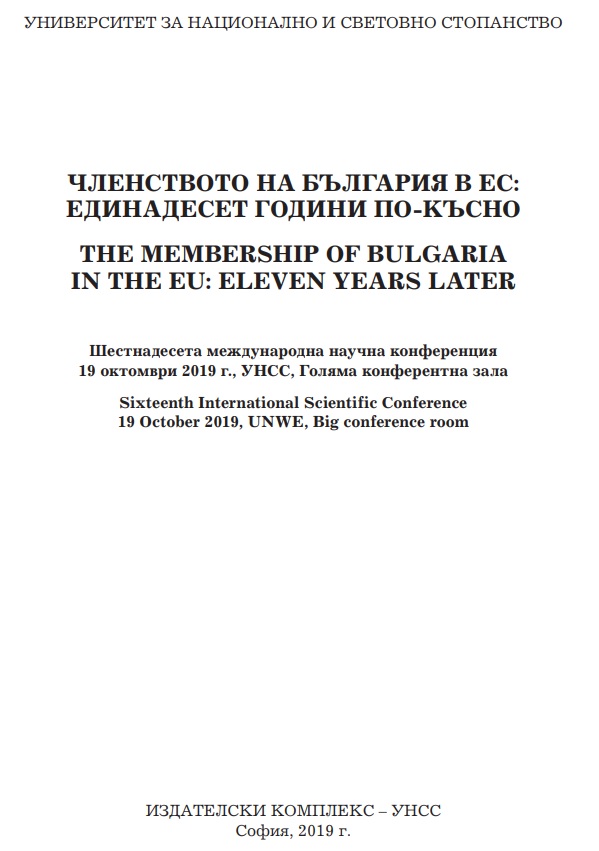
Business processes are going global nowadays, project teams include members spread across the globe. The managers face number of challenges managing these teams. They need not just to speak a few languages but to have solid knowledge of different cultures and habits as well as to effectively manage and motivate people who do not think the same way as they do. In this way, this report aims to present the main challenges that arise in managing intercultural teams. The presented position is that managers can effectively manage their teams by adhering to certain principles and strategies – adaptation, structural intervention, management intervention, exit.
More...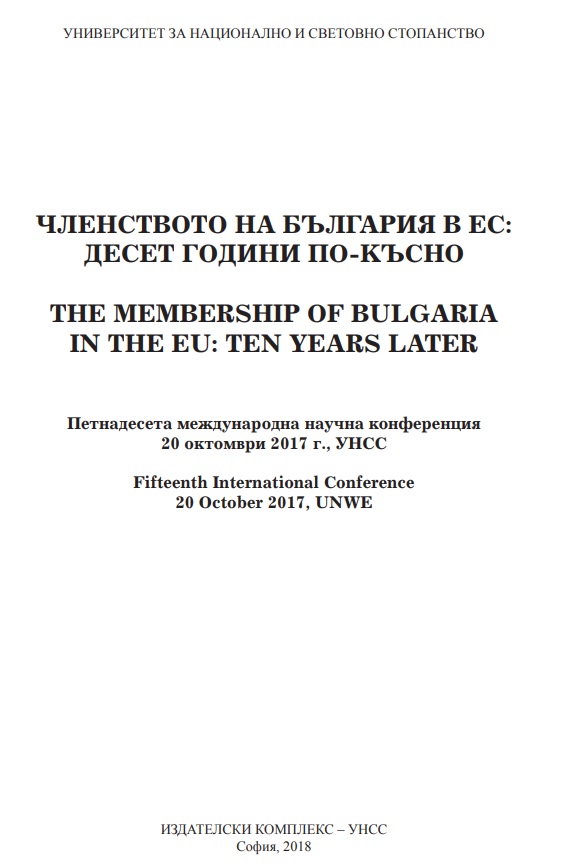
This report describes the current managerial challenges in realizing the onboarding activities for new incumbents on existing jobs in the companies. These challenges are disclosed through the lens of decisionmaking theory and the levels of culture formation in the field of appraisal for the initiated onboarding activities by the firm.
More...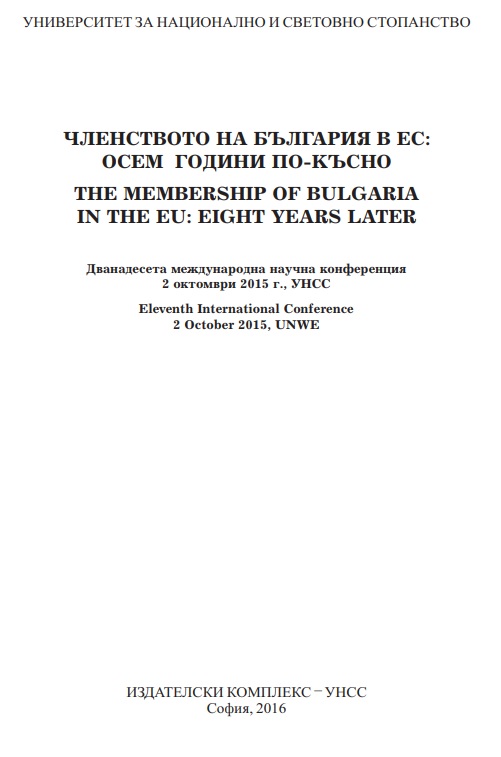
Global supply chains are a contemporary manifestation of international business, which allows different economies to utilize their competitive advantages to a greater level and participate in certain stages of a final product manufacturing process. One of the fundamental powers for their development in Bulgaria is the process of regional integration and in particular the preparation for accession and the subsequent membership of the country in the European Union. The supranational rules that apply to all member states, the free movement of goods, services, workers and capital and the step-by-step implementation of a common currency are the factors that let the Bulgarian economy restructure itself and participate successfully in global supply chains as a supplier of value-added goods and not as an exporter of raw materials.
More...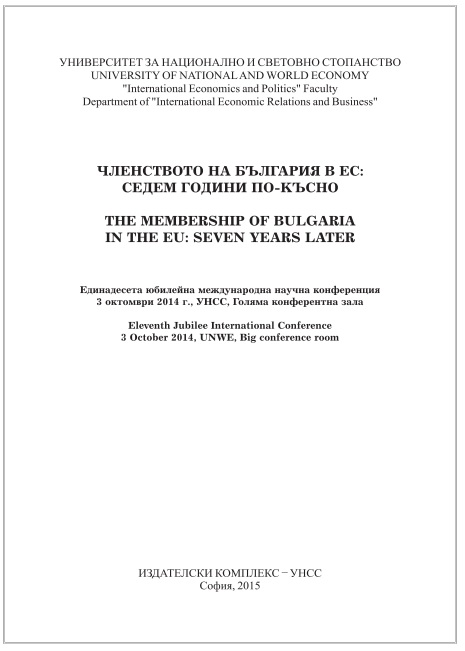
This book collects scientific papers and reports presented on the conference ‘The Membership of Bulgaria in the EU: Seven Years Later’ organized by the International Economic Relations and Business Department at University of National and World Economy (UNWE), Sofia, Bulgaria. The conference, held on 3 October 2014, traditionally provided a stage for prominent academics, dedicated PhD students and professionals to discuss contemporary topics related to multiple aspects of the European integration, its effects on the Bulgarian economy, socio-economic environment, international business and relations, finance and politics. The authors in this edition of the book thoroughly reviewed the economy of the Euro area and the EU as it progresses after the latest recession. A Group of authors focuses attention on the banking sector, monetary aspects and inflation, the development in the Economic and monetary union within EU, the Single Supervisory Mechanism and the overall competitiveness and recovery of the European markets. Cross-border partnership with EU neighbours and related instruments, cohesion among the EU member states, experience with the European funds and corresponding public procurement process are another thematic cluster discussed in the book. The researchers increasingly examine subjects related to the energy policy and security, the EU energy policy development and actions in particular. The contributors review matters related to the renewable energy sources, the establishment of the European Energy Union and other institutional and policy developments on supranational level. Another thematic cycle in the book is related to matters concerning the corporate management, business strategy and marketing, new markets expansion and interculturalism. This is intertwined with papers dedicated to the education, human resource involvement and adaptation to the working environment, research and innovation. ‘The Membership of Bulgaria in the EU: Seven Years Later’ is an annually organized academic event with the vision to foster open dialogue, offer contemporary research and exchange of ideas between fellow academics, policy makers, businesses, stakeholders and the public.
More...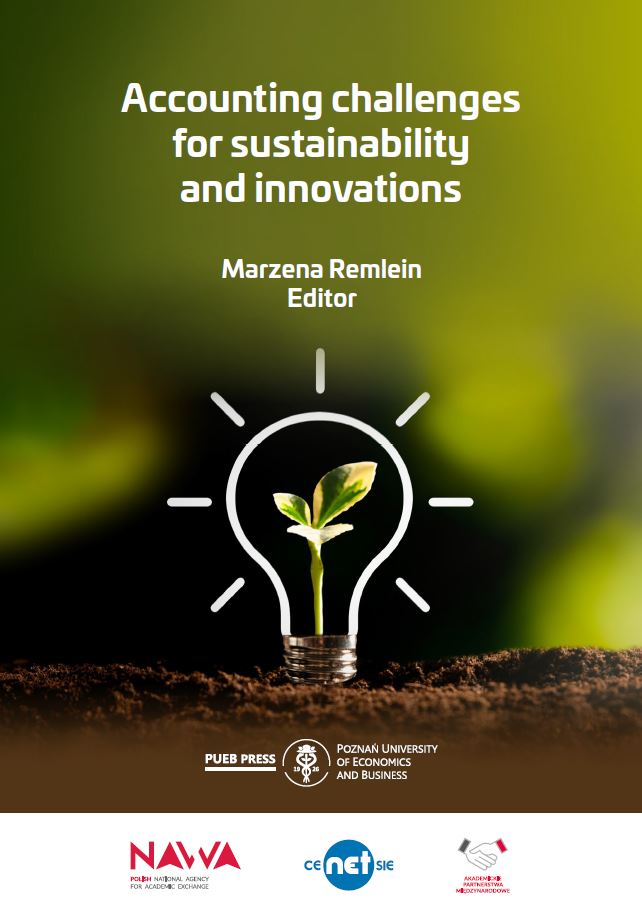
The term sustainable development is understood as such socio-economic development in which the process of integrating political, economic and social activities takes place, while maintaining natural balance and the durability of basic natural processes, in order to ensure the possibility of satisfying the basic needs of individual communities or citizens of both the modern generation, and future generations. Sustainable development has three dimensions: ecological, economic and social. A consequence of the growing importance of social and ecological aspects of business operations is the increased interest and requirements for reporting, understood as a set of reports containing both financial and non-financial information. This chapter covers the concept of sustainable development, CSR and explains the role, goals and challenges of social responsibility accounting. CSR reporting has become some kind of a trend in non-financial reporting. Many large international companies make great efforts to prepare CSR reports in order to transparently communicate with their stakeholders as well as strive to achieve established social and environmental goals. CSR covers different aspects of business, with, among other things, environmental issues being highlighted. The importance of green accounting has been recognized globally where the adoption of the 2014/95/EU Directive has just further raised awareness of the importance of reporting on the environment and environmental activities. This chapter covers the basic concept and development phases of sustainable and environmental accounting, explains the role of green accounting in modern business conditionsand discusses the benefits and opportunities it provides to interested users.
More...
It is well known that today, in addition to already established financial reporting, multinational companies are paying more and more attention to non-financial reporting on social, economic, environmental and governmental issues. Corporate Social Responsibility (CSR) reportingis still predominantly voluntary, and it is not standardized. However, there are various international organizations which have been developing frameworks and voluntary standards for non-financial reporting. Those organizations have been putting a sizable amount of effort, time, and knowledge in order to offer some specific solutions to interested organizations preparing CSR reports. Proposed standards, guidelines, and frameworks serve as tools for simplifying CSR reporting. In that sense, the most important providers of sustainability reporting guidance, such as GRI, OECD,United Nations Global Compact, International Organization for Standardization, certainly standout. A significant contribution to promoting the importance of sustainability reporting was also made by the Non-Financial Reporting Directive (2014/95/EU) which obliged large public interest companies with over 500 employees to disclose certain non-financial information. According to the analysis of the content and scope of the most important frameworks and standards of sustainability reporting, it can be confirmed that they have certainly contributed to improving the qualityof non-financial reporting.
More...
For years financial and management accounting reports were based primarily on “hard” numbers. Extensive written descriptions and explanations were not common in practice. However, inrecent decades there has been a significant shift towards “softer” and more narrative communicationin accounting. The purpose of the chapter is to identify and describe the determinants of the developmentof accounting narratives in practice, and to explain why narratives are gaining importance inaccounting communication. The chapter presents the links between accounting and language, the development of accounting narratives and the factors determining the use of narratives. Narratives give economic units the opportunity to explain the situation and the achieved financial results. The use of narratives helps to better meet the information needs of stakeholders. There are still many challenges ahead of narrative financial reporting, such as determining the minimum content of reports, ensuring comparability of reports or the issue of external control of narrative financial reporting. An insufficient application of professional accounting materiality judgment is considered as one of the main causes of disclosing too much irrelevant information and not enough relevant information. Preparers of narrative reports should be aware that without applying materiality principle the information disclosed in the reports are not considered transparent and stakeholders lose confidencein such companies.
More...
Companies struggle to communicate value through traditional reporting. Integrated reporting can prove to be an effective tool for businesses looking to shift their reporting focus from annual financial performance to long-term share holder value creation. Such a shift should cover the demand from investors for a structured reporting framework that goes beyond the traditional financial reporting. The International Integrated Reporting Framework will encourage the preparation of a report that shows business performance against strategy, explains the various capital used and affected, and gives a longer term view of the organization. The framework will be attractive to companies who wish to develop their narrative reporting around the business model to explain how the business has been developed. Integrated reporting attained various degrees of popularity depending on the geographical regions. While it is mandatory for all companies listed in South Africa’s stock exchange, in other regions it is used by businesses on voluntary basis. Research shows that in the USA the adoption of integrated reporting is slower than in most of theother developed regions.
More...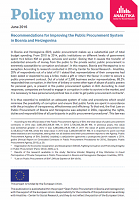
Javne nabavke u Bosni i Hercegovini (BiH) čine značajan udio u ukupnoj budžetskoj potrošnji. U periodu od 2010. do 2014. godine, javne institucije na različitim nivoima vlasti potrošile su 15,5 milijardi KM za nabavku roba, usluga i radova. S obzirom na to da na taj način dolazi do transfera značajne sume novca iz javnog u privatni sektor, javne su nabavke izuzetno podložne korupciji i zloupotrebama. Bosna i Hercegovina u tom smislu ne predstavlja izuzetak. Prema istraživanju koje je 2014. godine proveo Centar za društvena istraživanja “Analitika”, 20% ispitanika od ukupno 511 navelo je da je od predstavnika njihove kompanije traženo ili očekivano da daju mito, poklon ili protuuslugu kako bi dobili posao u postupku javnih nabavki. Također, od ukupno 2.500 anketiranih predstavnika poslovnog sektora, 88,2% ispitanih smatra da je korupcija u obliku mita ili druge vrste zloupotrebe javnih ovlasti za ličnu korist prisutna u javnim nabavkama u BiH. Prema odgovorima većine ispitanika, kompanije su prisiljene učestvovati u koruptivnim radnjama kako bi opstale na tržištu, a za dobijanje poslova u javnim nabavkama potrebno je imati političke i lične veze.
More...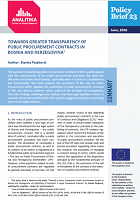
The question of publishing public procurement contracts in BiH is partly aligned with the requirements of the public procurement directives, but there are still some normative shortcomings, especially when it comes to completeness and functionality. This brief analyses the provisions of the Law on Public Procurement which regulate the publishing of public procurement contracts in BiH, and detects problems which undercut the principle of transparency. The main findings unambiguously indicate that thorough legislative reform is needed, and to that end the brief offers specific suggestions aimed at improving some of the legal solutions.
More...
Public procurement contracts result from the need to use budget funds efficiently and to bolster free market competition. They are an instrument of the realisation of public procurement. Concluding a public procurement contract marks the beginning of a new stage of public procurement realisation (post-tender stage), in which abuses that adversely affect the efficiency of the public procurement system may appear, like in any other stage. That is to say, adverse economic impacts, such as corruption, nepotism or favouritism, are not necessarily connected with the pre-contract stage, they can also appear in the post-tender stage. Such abuses should be prevented by appropriate legal norms. In Bosnia and Herzegovina (BiH), public procurement contracting is regulated by the Law on Public Procurement (hereinafter: LPP), which regulates public procurement implementation procedures. However, it does not regulate public procurement contracts fully, thus many issues related to the conclusion and execution of contracts remain out of regulatory reach. For this reason, relevant provisions of the Law on Obligations are applied to public procurement contracts as subsidiary law. As a result, we see the problem of application of the disposition principle, as one of the fundamental principles of civil law, that is, the autonomy of the will of the parties in concluding and executing the public procurement contract, the application of which principle in public procurement processes should be limited by imperative legal provisions. The publishing of public procurement contracts is one of the questions which should not be left to the discretion of the parties but rather regulated by imperative provisions of the LPP. Although provisions on the publishing of the public procurement contract have been included in the LPP, these provisions are neither sufficiently clear and precise, nor sufficiently harmonised with the existing European standards. Such regulation brings into question the proper implementation of the transparency principle, as one of the basic principles of public procurement. Previous research in this field also indicates that the transparency of public procurement contracts is a sore spot in the public procurement system in Bosnia and Herzegovina. Using the facts outlined above as a point of departure, this study sets out to analyse thoroughly the question of the publishing of public procurement contracts with a view to strengthening the transparency principle, which does not figure very significantly in the valid legislation in BiH. The study is primarily based on the analysis of primary and secondary legislation which regulates the publishing of concluded public procurement contracts, as well as the publishing of changes to such contracts. At the same time it examines the issue of limiting the transparency principle by invoking the principle of trade secret protection. It analyses the provisions of the LPP which are regulated by imperative norms on account of their specific nature, but also the relation of these norms to the civil law norms grounded in the general regulation, i.e. the LO. Despite the tendency to see public procurement contracts through the lens of civil law contracts, the nature of the specific contractual relations inherent in the public procurement contract dictates a somewhat different approach to the execution of the public procurement contract, and a completely different approach to the publishing of the public procurement contract. Relevant European Union (EU) legal standards are also discussed herein, as well as examples of best practices from member states. The study goes on to give an overview of the main debates in the field, focusing on the wider significance of ensuring transparency of public procurement contracts, keeping in mind at all times the instrumental nature of this principle. In the part devoted to the publishing of public procurement contracts, it overviews international standards focusing on relevant EU regulations, as well as on a comparison of experiences of member states which stand out as examples of good practices, especially countries from the region (Croatia and Slovenia) which have joined the EU. The study analyses the legal framework which regulates the publishing of public procurement contracts and the changes to such contracts in BiH, with a view to highlighting the key aspects – the positive sides of these contracts and their lack of transparency. It also discusses possible restrictions to the application of the transparency principle to the protection of confidential information of entrepreneurs – economic operators engaged in public procurement processes. The conclusion sums up the results of the analysis, and goes on to offer suggestions for the improvement of the existing normative framework to the publishing of the public procurement contract and the changes to it in the course of its execution.
More...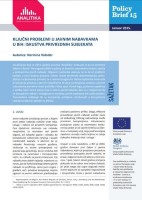
Istraživanje koje je 2014. godine provela “Analitika” pokazalo je da se privredni sektor u Bosni i Hercegovini (BiH) suočava sa brojnim preprekama tokom učešća u postupcima javnih nabavki. Odgovori ispitanika ukazuju na to da se problemi javljaju u svim fazama procesa: tokom izrade tenderske dokumentacije, prikupljanja i ocjenjivanja ponuda, te u realizaciji ugovora. Većina ispitanika smatra da je korupcija prisutna u javnim nabavkama, te da je za dobijanje poslova u javnim nabavkama potrebno imati političke i lične veze. Pored toga, poslovna zajednica u velikoj mjeri nema povjerenja u sistem javnih nabavki, kao ni u mogućnost da će koruptivne radnje i neodgovorno trošenje javnih sredstava biti sankcionirani. Preovladava mišljenje da su kompanije prisiljene učestvovati u koruptivnim radnjama kako bi opstale na tržištu.
More...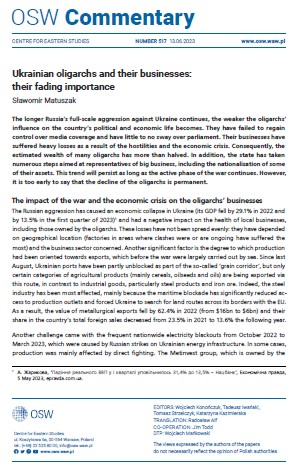
The longer Russia’s full-scale aggression against Ukraine continues, the weaker the oligarchs’ influence on the country’s political and economic life becomes. They have failed to regain control over media coverage and have little to no sway over parliament. Their businesses have suffered heavy losses as a result of the hostilities and the economic crisis. Consequently, the estimated wealth of many oligarchs has more than halved. In addition, the state has taken numerous steps aimed at representatives of big business, including the nationalization of some of their assets. This trend will persist as long as the active phase of the war continues. However, it is too early to say that the decline of the oligarchs is permanent.
More...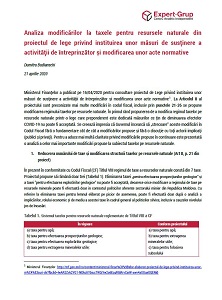
Ministerul Finanțelor a publicat pe 16/04/2020 pentru consultare proiectul de Lege privind instituirea unor măsuri de susținere a activității de întreprinzător și modificarea unor acte normative. La Articolul II al proiectului sunt preconizate mai multe modificări în codul fiscal, inclusiv prin punctele 21-26 se propune modificarea regimului taxelor pe resursele naturale. În primul rând propunerea de a modifica regimul taxelor pe resursele naturale printr-o lege care preponderent este dedicată măsurilor ce țin de diminuarea efectelor COVID-19 nu poate fi acceptată. Se creează impresia că Guvernul încearcă să „strecoare” aceste modificări în Codul Fiscal fără o fundamentare cât de cât a modificărilor propuse și fără o discuție cu toți actorii implicați (publici și privați). Pentru a aduce mai multă claritate privind modificările propuse în continuare este prezentată o analiză a celor mai importante modificări propuse la subiectul taxelor pe resursele naturale.
More...